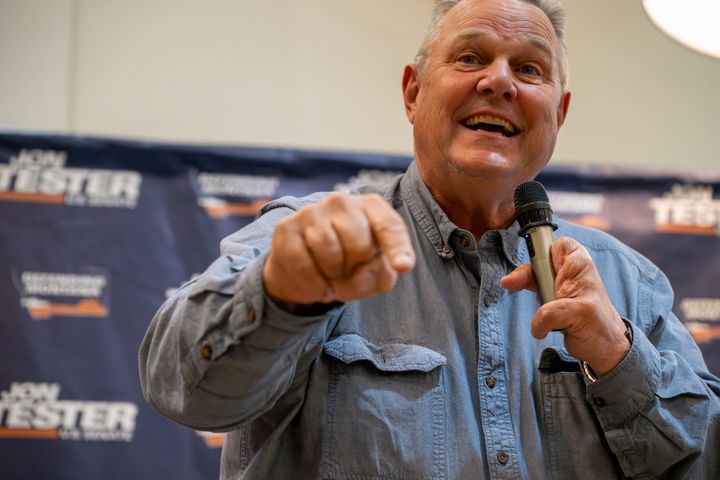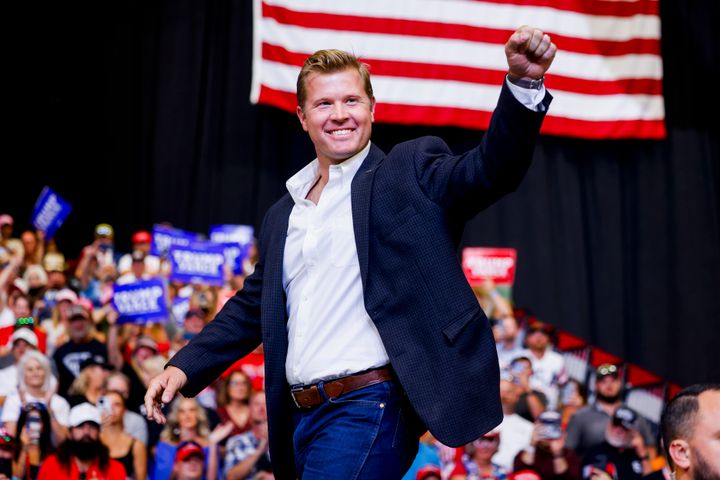Montana Democratic Sen. Jon Tester and Republican challenger Tim Sheehy spent a full seven minutes of Monday night’s one-hour debate sparring over the issue of federal public lands.
Tester, who is running for a fourth term in a pivotal race that could ultimately decide which party controls the Senate next year, repeatedly painted Sheehy as a threat to America’s public lands and the Montana way of life.
He referred multiple times to HuffPost’s reporting that first revealed Sheehy called for federal lands to be “turned over” to states or counties; failed to disclose his post on the board of the Property and Environment Research Center, a Bozeman-based property rights and environmental research nonprofit with a history of advocating for privatizing federal lands; and appeared to doctor a recent TV ad to remove PERC’s logo from the shirt he was wearing.
Sheehy largely avoided engaging in the specifics of Tester’s attacks, instead continuing a muddled effort to rewrite his record on the issue and accusing Tester of trying to tear down any organization he has been affiliated with.
The extensive back-and-forth came after Montana PBS journalist John Twiggs asked the candidates which entities are best equipped to manage the approximately 27 million acres of federal lands in Montana while maintaining public access.
“Bottom line: Public lands belong in public hands,” Sheehy said.
Tester marveled at what he described as Sheehy’s “incredible transformation on this issue” while warning voters to “watch out what people say in back rooms.”
“What they say in back rooms, when they don’t think the recorder is going or the camera is running, is usually what they think,” he said. “And Tim said we need to turn our lands over to either his rich buddies or county government. That’s not protecting public lands.”

Tester was referring to comments Sheehy made to a ranching podcast last October, shortly after launching his Senate bid. As HuffPost first reported, Sheehy told the “Working Ranch Radio Show” that “local control has to be returned, whether that means, you know, some of these public lands get turned over to state agencies, or even counties, or whether those decisions are made by a local landlord instead of by, you know, federal fiat a few thousand miles away.”
While Sheehy has spent the past year doing damage control on this issue, claiming he opposes the sale or transfer of federal lands despite his own words to the contrary, his comments Monday make clear that when he says “public hands,” he means the hands of Montanans only.
“Public lands belong to the public, that’s you — the people of Montana,” Sheehy said. “Public lands belong to the people, especially those who live amongst them. And I believe that if you’re a Montanan and you share a fence line with National Forest property, if you’re a rancher who has a [Bureau of Land Management] grazing lease, if you live next to state trust land, you should have more input into what happens on that land than bureaucrats 3,000 miles away.”
Sheehy, a former Navy SEAL and multimillionaire businessman, owns a sprawling ranch in Martinsdale, Montana, that, notably, shares a fence line with Forest Service land and once offered high-dollar hunting excursions with what it called “private access to over 500,000 acres of National Forest.”
Sheehy’s position — that federal agencies are poor stewards of the federal estate and that locals know best how to manage federal lands — disregards the fact that federal lands, in Montana and everywhere else, are held in trust for all Americans, regardless of where they live, not just those who happen to live next door.
“I, absolutely, will every day advocate for more local control of those lands, because I believe they belong to you, not the government,” Sheehy said.

Sheehy is walking the same fine line as many members of the GOP. Republicans in Western states have spent decades working to wrest control of federal lands from the federal government. But broad public support for protecting public lands has forced them to largely abandon calls for outright transfer and sale and instead advocate for giving states broad management authority — a move that would ultimately allow them to achieve many of the same industry-friendly goals that would come with stripping lands from federal control.
Again and again, Tester brought the conversation back to Sheehy’s record.
“Tim even served on a think tank, on their board of directors, that’s job was to privatize our public lands,” Tester said. “In Tim’s case, his view of turning these lands over to counties or opening ’em up for his rich friends to buy them, is just the wrong direction to go for Montana.”
Sheehy defended himself with a false claim about PERC: “No one, including myself, in that organization has ever advocated for selling our public lands — never have, never will.”
In fact, in a 1999 policy paper titled “How and Why to Privatize Federal Lands,” PERC’s then-director, Terry Anderson, and others laid out what they called “a blueprint for auctioning off all public lands over 20 to 40 years.” (PERC previously told HuffPost that that paper “is not representative of PERC’s current thinking.”)
“Tim, it’s time to be honest with the people of Montana,” Tester fired back. “You were on a board of an organization that wanted to privatize our public lands. In fact, you even dulled out a badge on one of your ads of a shirt that you wore that was promoting that group. When you found out that badge was on there you said, ‘Hey we can’t be doing that because these guys, I served on their board and they want to get rid of our public lands.’”
“You also didn’t even disclose to the public when you filed for this position that you belonged on that board,” Tester added. “Why? It wasn’t because they were a great organization doing great things for our public lands. It was because they wanted to get rid of our public lands and you were a part of that organization and you didn’t want anybody to know about it.”
As HuffPost first reported, Sheehy failed to include his post on PERC’s board in his Senate financial disclosure — a violation of Senate rules that Sheehy’s campaign chalked up to an “oversight.” Since its founding in 1980, PERC has called for privatizing federal lands, including national parks, and been a staunch opponent of Montana’s unique stream access laws, which provide anglers and recreationists virtually unlimited access to the state’s rivers and streams, including those that flow through private property.
Sheehy’s pro-transfer comments and ties to PERC have been a consistent thorn in the side of his campaign, which over the past year has run a damage-control effort aimed at recasting Sheehy as a champion of public lands. Sheehy’s campaign recently aired a public lands-focused TV ad that featured a current PERC board member, and last month sent out public land mailers to Montana voters that included a picture of Sheehy wearing a flannel shirt with the PERC logo clearly visible on one sleeve. More recently, Sheehy’s team doctored a TV advertisement to remove PERC’s logo from the shirt he was wearing.
At Monday’s debate, Sheehy said Tester’s attacks against PERC are part of a pattern.
“The reason that organization has been criticized by Jon Tester is simply because I was affiliated with it,” he said. “And this has been their plan this entire campaign. If Tim Sheehy is affiliated with anything, attack it, tear it down, smear it.”
If Monday’s debate shined light on anything, it’s that Sheehy has gotten an earful from Montana voters who support protecting and preserving federal public lands. But unlike Rep. Matt Rosendale (R-Mont.), who credited voters with changing his mind on transferring federal lands to states when he ran against Tester in 2018, Sheehy is refusing to acknowledge the reason for having walked back, or disguised, his anti-federal land views.
Whether Sheehy’s newfound opposition to pawning off public lands would survive a six-year Senate term remains to be seen — if he manages to defeat Tester in November.
During the debate, the Montana Republican Party took to X, formerly Twitter, to defend their candidate against Tester’s repeated swings.
“@SheehyforMT will work to preserve and expand public access to your public lands and he will KEEP PUBLIC LANDS IN PUBLIC HANDS!” the party wrote.
Just three months ago, the Montana GOP — the party Sheehy is seeking a leadership role in — adopted a party platform that explicitly calls for the “granting of federally managed public lands to the state, and development of a transition plan for the timely and orderly transfer.”
Disclaimer: The copyright of this article belongs to the original author. Reposting this article is solely for the purpose of information dissemination and does not constitute any investment advice. If there is any infringement, please contact us immediately. We will make corrections or deletions as necessary. Thank you.
